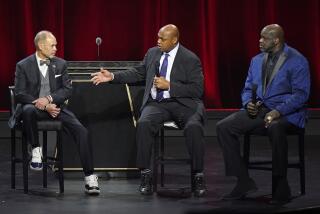AT&T deal for DirecTV driven by desire to pare programming costs
For anyone wondering what’s driving AT&T Inc.’s nearly $50-billion deal to buy satellite broadcaster DirecTV, look no further than a new report issued by the Federal Communications Commission on cable TV rates.
The FCC report noted DirecTV is often able to negotiate lower fees for channels than its smaller rivals because of its size and national reach. By acquiring the satellite provider, AT&T gets access to 20 million more homes around the country — and the clout to demand lower rates from cable networks and other content providers.
Along with gaining more programming, AT&T also believed that it needed to get bigger to compete with Comcast Corp., the nation’s largest video and broadband company that is seeking regulatory approval to buy Time Warner Cable Inc. for $45.2 billion.
Comcast’s bold move, announced in February, played a part in Randall Stephenson, AT&T’s chairman and chief executive, reigniting talks with DirecTV Chief Executive Mike White about a sale. Stephenson said the two have had on-again, off-again discussions for years that heated up again in late spring.
One of the unintended consequences of the consolidation spree is that those left without a new partner may end up paying more for content. Programmers who get squeezed by the big broadcasters then turn around and squeeze the smaller players.
Getting content — at the best price possible — is increasingly what the game is all about, media analysts said. They pointed to a clause in the deal between the two companies that would allow AT&T to terminate the acquisition if DirecTV can’t renew its contract with the National Football League for Sunday Ticket, its sports package that enables subscribers to watch every Sunday game across the country.
Sunday Ticket may have relatively few subscribers, but it is exclusive sports content — and providing that kind of programming will be crucial for media and telecommunications companies going forward as they navigate a constantly shifting media landscape.
“Consumers want everything everywhere and faster,” said Boston University School of Management Professor Samina Karim. “That’s really where we are going.”
Stephenson has repeatedly emphasized video content as the deal’s driving factor. The combination will “redefine video entertainment for the mobile and high speed world.... That was the key rationale for trying to do something with DirecTV,” he said Monday.
Media analysts and industry leaders have long been trying to figure out the best pipeline to get content to consumers. With its purchase of DirecTV, based in El Segundo, AT&T is making a bet on all pathways. The combined company would reach consumers from a satellite service, broadband Internet and wireless platforms. It would also have AT&T’s more traditional U-Verse video service.
“The next six years are going to be about delivering video over these networks,” Stephenson said, adding that “you will see the experiences beginning to merge and user interfaces will all look and feel the same.”
DirecTV and AT&T saw their share prices drop slightly Monday, the day after the deal was announced. Some analysts have questioned whether DirecTV is a good fit for AT&T in the long run and believe that AT&T is paying a premium for a company in a very mature business. There are also concerns about younger people who have opted out of traditional TV services in favor of online offerings such as Netflix and Hulu.
Nonetheless, AT&T has said it expects savings of at least $1.6 billion, primarily in programming costs.
Comcast has an advantage when it comes to content because it’s the parent of NBCUniversal, which owns Universal Studios, the NBC television network and a slew of cable channels including USA, CNBC and MSNBC. DirecTV owns a few regional sports networks and has one entertainment channel.
AT&T’s play for DirecTV will probably mean greater scrutiny for both deals.
“Congress and the FCC must not forget consumers who are not served, and will never be served, by Comcast and AT&T, in smaller cities and rural areas, as well as those consumers who elect to subscribe to these big companies’ smaller rivals in urban areas,” said Matthew Polka, president of the American Cable Assn., which lobbies on behalf of mid-size and small cable operators.
Executives from both companies expect that their deals will be approved by the FCC and Justice Department this year, despite deep concerns by some lawmakers.
“I think both have a little bit of a problem; there will be significant concentration in the marketplace,” said Jason Buckweitz, associate director of Columbia Business School’s Institute for Tele-Information.
Still, some analysts believe that an approval of the Comcast and Time Warner Cable deal would probably make it easier for AT&T to get approval for its own deal.
“It is going to be very difficult for the Department of Justice to find a reason why one deal would be allowable and the other wouldn’t,” Buckweitz said.
Senate Judiciary Committee Chairman Patrick J. Leahy (D-Vt.) said he was concerned about a fast-consolidating telecommunications industry that “is trending even further toward one that favors big companies over consumers.”
And Sen. Al Franken (D-Minn), a loud critic of Comcast’s Time Warner Cable deal, said he was skeptical of the AT&T-DirecTV combination as well.
“We’re moving toward an industry with fewer competitors — where corporations are getting bigger and bigger and gaining more and more control over the distribution of information,” Franken said. “This hurts innovation, and it’s bad for consumers, who have been getting squeezed by higher bills.”
The Senate antitrust subcommittee, chaired by Sen. Amy Klobuchar (D-Minn.), has already said it would hold a hearing on the AT&T-DirecTV deal.
“AT&T’s proposed acquisition of DirecTV is yet another merger that has the potential to dramatically change the television market,” she said.
Another major merger review adds to a busy agenda for FCC Chairman Tom Wheeler.
In addition to the two telecom mergers, the agency is considering controversial net neutrality rules for Internet traffic and revised regulations covering ownership of multiple media outlets in the same market. The FCC also is trying to get broadcasters to give up a portion of their airwaves to be auctioned off for expanded wireless services next year.
The consolidation is not expected to stop with the Comcast and AT&T deals. Other media and telecommunication companies, including Dish Network, Cox Communications and Verizon, may start worrying about being left out of the dance.
Flint reported from Los Angeles and Puzzanghera from Washington. Amy Kaufman contributed to this report.








